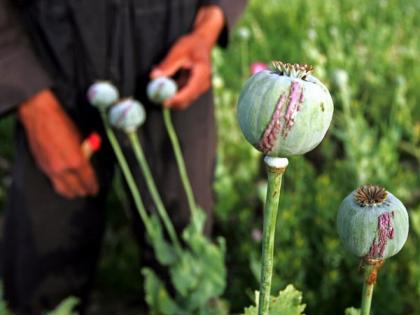Taliban looks to secure cash flow by continuing Afghanistan's lucrative drug trade: Experts
By ANI | Published: August 31, 2021 09:51 PM2021-08-31T21:51:02+5:302021-08-31T22:00:02+5:30
After the takeover of Afghanistan by the Taliban, the group is looking to sustain the new regime by securing its cash flow through the lucrative drug trade.

Taliban looks to secure cash flow by continuing Afghanistan's lucrative drug trade: Experts
After the takeover of Afghanistan by the Taliban, the group is looking to sustain the new regime by securing its cash flow through the lucrative drug trade.
Rachel Brooks, writing in The Epoch Times said that the analysts believe that the country's already bustling drug trade will continue to grow under the Taliban as the group is poised to take control of the country's billion-dollar opium and heroin trade.
Afghanistan is the world's largest illicit opiate supplier, with the United Nations Office on Drugs and Crime (UNODC) estimating the country accounts for 80 per cent of global opium and heroin supply.
Since taking power in Kabul, the group has indicated it will move to ban the drug trade. But the Taliban looks to secure cash flow to sustain a new regime.
The Taliban has leveraged the illicit opium and heroin trade for its own economic gain since the group formed and rose to power in the early-to-mid 1990s.
"The Taliban considers themselves devout Muslims. But, when it comes to cultivating and exporting opium, they don't have an issue," said Terry Blevins, the chief executive officer of ARMAPLEX Security and a former police sergeant.
While the terrorist group has changed its narrative around its narcotics trade in the past, it has remained consistent in using the drugs to fund its operations, according to Jason Li, a research associate with the East Asia Program at the Stimson Center.
Estimates of the Taliban's annual revenue from drug trade range from the tens of millions up to USD 400 million, according to one UN report, which the group earns from levying taxes on opium production, heroin labs, and drug traffickers, reported The Epoch Times.
A 2018 Special Inspector General for Afghanistan Reconstruction (SIGAR) report said that illicit narcotics account for 60 per cent of the Taliban's annual revenue, says Brooks.
"The illicit opiate trade out of Afghanistan will likely continue--under covert and less official auspices. Illicit production was not curbed under the US-supported Ghani regime," Li said, referring to the former Afghanistan government that crumbled when President Ashraf Ghani deserted Kabul.
Li pointed out that, according to UNODC, profits from opium and heroin have grown in recent years. "That has important implications for how the Taliban will frame its stance on illicit drug flows in search of international recognition," he added.
While the Taliban risks strong global backlash if it supports illicit drug trading, analysts expect an uptick in production as the group looks to secure sources of funding, says Brooks.
( With inputs from ANI )
Disclaimer: This post has been auto-published from an agency feed without any modifications to the text and has not been reviewed by an editor
Open in app